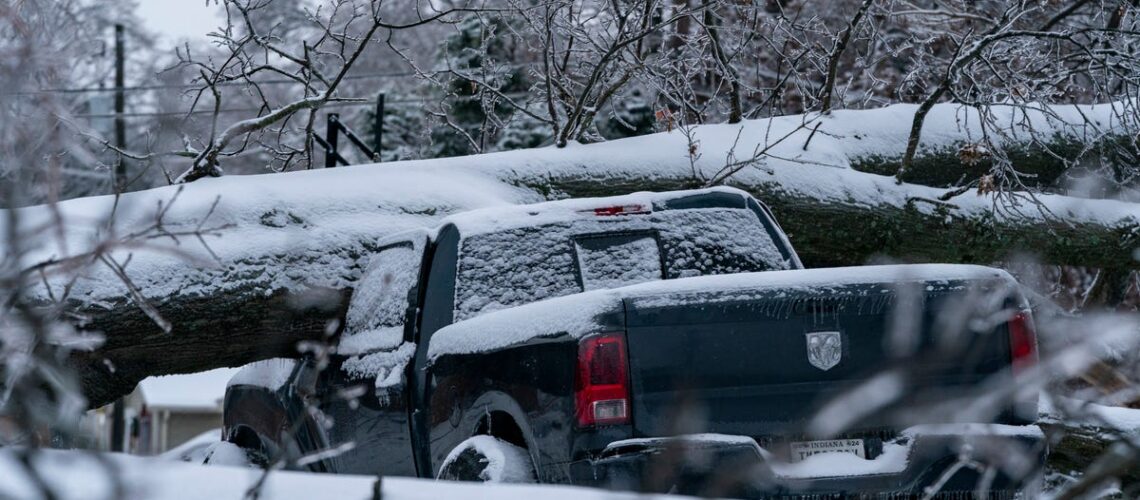Storm-related insurance claims for ice, snow and falling trees
January 7, 2025

- How to fix health insurance premiums, copays, and deductibles
- NC saw progress in health insurance coverage in 2024, but problems with access were revealed • NC Newsline
- Colorado adds record insurance coverage for QB Sanders, Hunter
- Home Value Lock Insurance Now Available to Century 21’s Select Real Estate Clients
- California fires highlight insurance issues across nation, including in New Jersey
EVANSVILLE — So your tree fell on your neighbor’s house, or his tree fell on yours. You stockpiled your refrigerator with food in anticipation of a winter storm — and lost it all when the power went out.
Bạn đang xem: Storm-related insurance claims for ice, snow and falling trees
Sometimes homeowner’s insurance will cover you, a veteran agent said Monday. Sometimes it won’t. Sometimes — if you’ve got the stomach for it — you can fight.
Start with what the insurance biz calls an “act of God” — an event beyond human control, that can’t be prevented. Like a vicious winter storm, a hurricane, flood or an earthquake.
“If your tree falls on (a neighbor’s) property, their insurance will pay for it because it’s an act of God,” said State Farm agent Bob Davis. “If their tree falls on your property, you or your insurance will have to pay for it.”
Davis stressed that these are typical but not automatic outcomes.
Let’s say you know or suspect your neighbor’s old tree — the monster that caved in your car or turned your roof from an innie into an outie — was already dead and he knew it.
It’s a longshot and it doesn’t happen often, Davis said — but there are countermeasures you can take.
You can hire an arborist to offer an opinion about whether your neighbor’s tree is dead before it falls because you think it’s lined up perfectly to strike your house when it does.
“If that arborist comes out and says, ‘Hey, that tree’s dead,’ you’d send in a certified letter to your neighbor that says, ‘Hey, this tree is dead,'” Davis said.
“At that point, then basically, your neighbor would probably, nine times out of 10, would have to be responsible for their tree falling on your stuff because one, they knew it was dead, and two, you could prove they knew it was dead because they got a certified letter from you.”
Alternately, after the tree falls you can survey local arborists to see whether any of them ever declared it dead.
It’s a lot of trouble to go to, Davis said, which is why such legal challenges rarely occur. But it’s an option for the forward-looking policyholder.
So is taking photos of the food in your refrigerator.
That is, if you want to claim it as a loss after the power goes off and turns your hamburger meat into an unpleasant pile of pathogenic bacteria.
Xem thêm : Workers’ Comp Insurance Cancellations Must Be Unambiguous
“The insurance is going to want to know what you had in there (the refrigerator),” Davis said. “And for your records and for their records, it’s just easier to say you had this (food) because you took a picture of it.”
State Farm agent Kasey Gray-Fuquay stressed the value of photos.
“Take pictures of everything, document, prepare your home the best you can to secure it from any more damage happening,” Gray-Fuquay said.
Centers for Disease Control guidance outlines the following perishable food-related steps to take during a power outage:
- Keep refrigerator and freezer doors closed.
- If the doors stay closed, food will stay safe up to: 4 hours in a refrigerator, 48 hours in a full freezer, 24 hours in a half-full freezer.
- If the power has been out for 4 hours, and a cooler and ice are available, put refrigerated perishable foods in the cooler. To keep them at 40°F or below, add ice or a cold source like frozen gel packs.
After a power outage, the CDC advises:
- Never taste food to know if it is safe to eat. When in doubt, throw it out.
- Throw out perishable food in your refrigerator (meat, fish, cut fruits and vegetables, eggs, milk, and leftovers) after four hours without power or without a cold source like ice. Throw out any food with an unusual smell, color, or texture.
- If you have an appliance thermometer in your refrigerator, check to see if it is still at 40 degrees or below.
- Check temperatures of food kept in coolers or your refrigerator with an added cold source. Throw out food that has thawed or is above 40 degrees.
- You can safely refreeze or cook thawed frozen food that still contains ice crystals or is at 40 degrees or below.
- Check FoodSafety.gov chart for a list of what foods you should throw out and foods you can refreeze.
One more thing:
As a general principal, Davis said, homeowner’s insurance does not cover for weather. It doesn’t pay for hotels because it’s cold outside or inside.
“If your pipes burst and you have water damage, that’s something that would be covered,” the veteran agent said. “But just because your power’s off, that’s not ‘uninhabitable.’”
Nguồn: https://propertytax.pics
Danh mục: News
